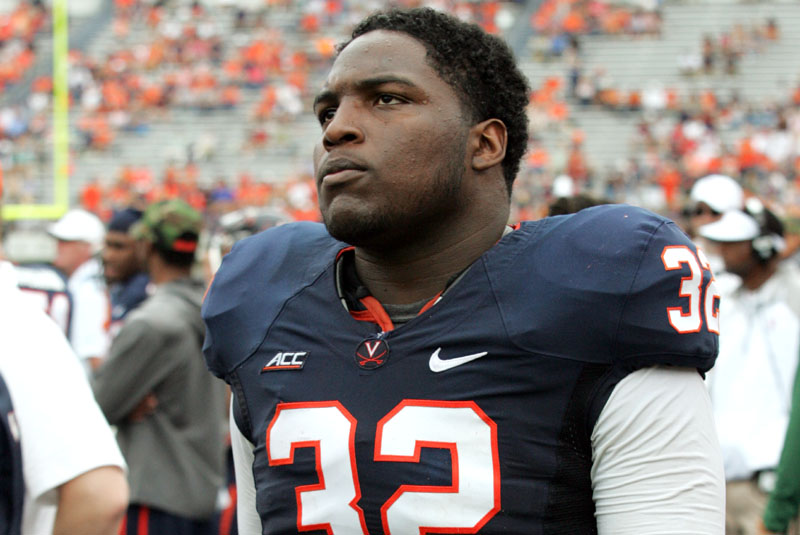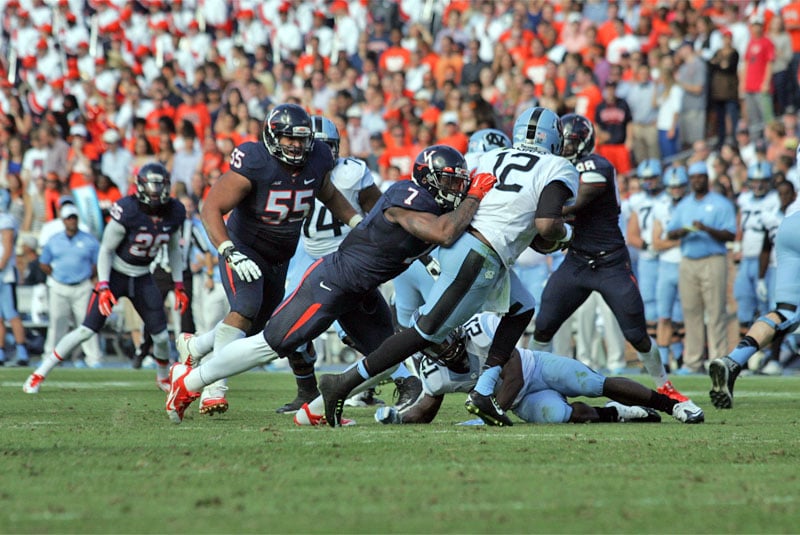
Virginia travels to Tallahassee to take on Florida State on Saturday night for an ESPN showdown. The Seminoles, the reigning National Champions, remain in contention for a FBS playoff spot. Can the Cavaliers play spoiler? It will take the best effort of the season to get the upset.
Essentials
- Location: Doak Campbell Stadium, Tallahassee, FL
- Game Time: Saturday, Nov. 8, 6:30 p.m.
- TV Info: ESPN
- Radio Info: WINA 1070AM
- Live Radio Feed: Cavaliers Live
- UVa TV/Radio Affiliates
- Live Game Tracker Stats
- Doak Campbell Stadium Information
- Tailgating Info and Policies
- UVa Official Notes and Stats – printable pdf
- Florida State Notes and Stats – printable pdf
- Projected Depth Chart – printable pdf
- UVa vs Florida State Roster Card – printable pdf
- Exclusive Weather Updates
Game Nuggets
- This is the 18th meeting between Florida State and Virginia. The Seminoles own a 14-3 all-time record in the series, but the Cavaliers won the last meeting in 2011 with a 14-13 win in Tallahassee.
- This is the third meeting in five years between the two schools, but there is only one scheduled contest in the next 10 years after this game.
- With a 6:30 p.m. kickoff, this is 97th night time kickoff in Virginia history. The Wahoos are 55-40-1 all-time in night games, including a 3-1 record under coach Mike London.
- FSU enters this contest with a 24-game winning streak. With a victory, Florida State could become the 25th team in college football history to win 25 straight. The Seminoles also have won 20 straight against conference competition.
- Florida State’s offensive line has 143 combined starts among the five players. Only Ryan Hoefeld has started less than 30 games in his career.
Spotlight on Rashad Greene
UCLA’s Jordan Payton: eight catches, 98 yards. Richmond’s Stephen Barnette: 10 catches, 124 yards. Richmond’s Rashad Ponder: eight catches, 100 yards. Kent State’s James Brooks: three catches, 76 yards, one touchdown. Pitt’s Tyler Boyd: three catches, 63 yards. Duke’s Jamison Crowder: eight catches, 99 yards. UNC’s Mack Hollins: two catches, 120 yards, two touchdowns. Georgia Tech’s DeAndre Smelter: four catches, 107 yards, one touchdown.
Rashad Greene, you’re on the clock.
As good as Virginia’s defense has been this season, there have been some strong performances from opposing receivers either with catches or yards or both. Greene enters the match-up with Virginia as Florida State’s record holder with 229 career receptions; the previous record of 212 by Ron Sellers had stood since 1968. That number ties Greene for fifth all-time in ACC history. He’s within striking distance for the school records in receiving yards and receiving touchdowns too.
This season, Greene leads the ACC in receiving yards (853), receiving yards per game (106.6), receptions (58), and receptions per game (7.2). Greene, who is the league leader in punt return average (11.1), also has posted four touchdown catches this season.
With a blend of speed and route variety, Greene can threaten the defense in a lot of ways. He’s one of FSU’s favorite targets on third downs thanks to the ability to run multiple patterns. Long story short: he’s a handful to defend.
“He comes here, doesn’t say much in the locker room, doesn’t say much in the meeting room, but he chooses to work every single day,” FSU running back Karlos Williams said in this Orlando newspaper article. “The way he works on the football field, the way he works during walk-through. Just that focus and attention to detail is what makes Rashad, Rashad Greene. He’s not going to be a big, flashy receiver.”

Match-Ups To Watch
Virginia’s Eli Harold vs. Florida State’s Cameron Erving and the offensive line. Harold is ranked No. 1 in the ACC and 17th nationally with 13 tackles for loss. That includes seven sacks, giving him 17.5 in his Wahoo career. Harold can be a game-changer on the edge. This week, he faces an experienced veteran in Erving, who has made 36 career starts for FSU. He’s the type of player that has managed to at least slow down Harold in the past.
Florida State’s Mario Edwards and Eddie Goldman vs. Virginia’s Sadiq Olanrewaju and the offensive line. UVa’s pass protection has been statistically solid, allowing just eight on the season (tied for 12th nationally), but it has been showing some leaks in recent weeks, particularly with overlapping blitzes. The run game, meanwhile, has been stagnant after a strong outing against Pittsburgh. Edwards, a linebacker to Olanrewaju’s side, has posted six tackles for loss with two sacks and he can be disruptive for both the passing and rushing attack. Goldman, a defensive tackle, has 7.5 tackles for loss with four sacks and he can cause issues with penetration into the backfield.
Virginia’s Greyson Lambert and Matt Johns vs. Florida State’s pass defense. Virginia’s starting quarterbacks have been inconsistent over the past five weeks, putting together good drives and sometimes quarters, but never complete games. Lambert has thrown five touchdown passes with eight interceptions, while Johns has the flipped image with eight touchdown passes and five interceptions but a lower completion percentage. FSU’s pass defense is third in the ACC in pass break-ups (4.5 per game) and has posted 17 break-ups in the past two games. The Noles also have snared eight interceptions this season, good enough for 50th nationally (tie).
Florida State’s Jameis Winston vs. Virginia’s pass defense. Over the past two weeks, the Cavaliers have experienced breakdowns in the secondary that have led to big plays for North Carolina and Georgia Tech. This week, Winston guides a strong passing attack that will challenge the pass defense again. Entering the game, Winston is the NCAA’s active leader in passer rating (172.63) and he averages 325.6 passing yards per game. He has 16 passing touchdowns this season and has thrown at least one touchdown pass in 21 straight games.
Kris’ Keys
1. Turnovers, turnovers, turnovers. Another Virginia game, another set of turnovers. If we couldn’t laugh, we would all go insane. The Hoos now have 19 turnovers this season, tied for 114th nationally out of 128 FBS teams. Keep turning it over and keep losing. It’s one thing that has to change if anything is going to change with the results.
2. Third down. FSU’s offense converts 47% of the time on third down, good enough for 20th nationally. UVa’s defense allows 37.7% conversions on third down, which ranks 51st nationally. If the defense is going to keep the scoreboard within a winnable range, it’s going to have to win some third down battles. On the other side, Virginia’s offense converts 44.1% of its third downs (32nd nationally) and faces an FSU defense that has allowed 40.3% conversions on third down, which is tied for 79th nationally. The Hoos will need some success on third down (and in the red zone) to stay in touch on the scoreboard.
3. No special teams issues. Florida State’s speed is concerning and it’s a trait that is especially worrisome on special teams where coverage breakdowns can spell big play trouble.
The Pick
Tick, tick, tick. The clock is ticking on the 2014 season and the recent three-game slide is not encouraging.
Virginia can win if … its offense can provide at least 30 points. The Cavaliers average 26.7 points per game, which is tied for 83rd nationally with Purdue. From the ‘news actually could be worse department’: FSU allows 12.0 points per game at home during the Jimbo Fisher era.
Virginia can lose if … the defense gives up explosive scoring plays. FSU reeled off five second-half touchdowns of at least 35 yards at Louisville in its most recent win. UVa’s defense has had problems in the Jon Tenuta era with allowing some big plays and that’s a recipe for disaster against the Seminoles.
And the winner is … Florida State. I don’t expect it to be close by the end of the third quarter. Florida State 44, Virginia 20. Prediction record to date: 6-3.



